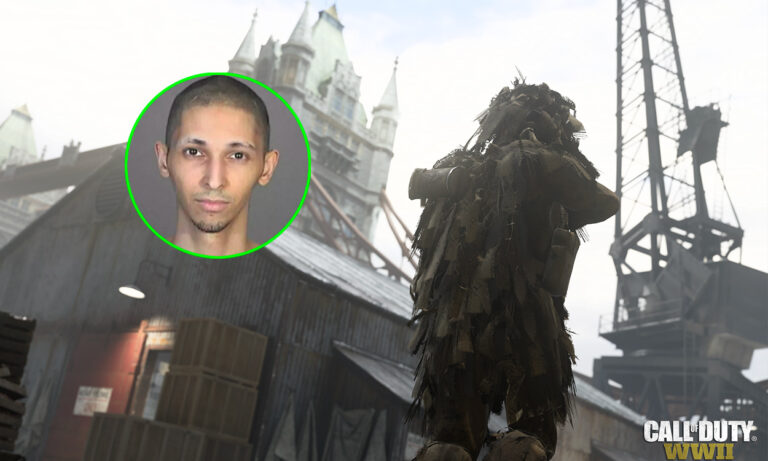Family of innocent man killed over Call of Duty swatting hoax finally receives settlement

The city of Wichita, Kansas has finally agreed to settle with the family of murdered father, Andrew Finch, for $5 million, five years after he was shot by police as a result of a swatting hoax call, intended for a separate Call of Duty player entrenched in an online wager.
An incredibly low point for gaming, this tragic affair not only sheds light on the dangers present in the online world, but also the systematic faults that lay in US police force, where an unarmed man can be shot outside of his home, simply because a stranger had his address.
The incident took place on 28 december 2017, when two Call of Duty: WWII players, Casey Viner and Shane Gaskill, got into a fight after wagering the incredible, life-changing sum of… $1.50. A feud over the bet led Gaskill to contact renowned serial swatter Tyler Barriss—who is now serving 20 years in prison as a result of the shooting.
Swatting refers to when a fake threat is called to the address of either someone streaming games online or an individual you may be playing with. If you’re able to get ahold of their address, one quick call to the local police department claiming to be involved in a public safety situation will send authorities running straight to the home of the victim, more often than not in a terrifying and disruptive manner.
The hoax caller, who is now known for calling in fake calls threatening the public’s safety was purposefully provided a wrong address, with court records showing that Gaskill had egged on Barriss to “please try some shit.”
The challenge was enough for Barriss, and that same night, an innocent victim was shot when police officers surrounded his house as a result of the prank call, which suggested a hostage situation was taking place at the Finches’ home.
Thankfully, the city has finally agreed to settle with the family of the murdered 28-year-old, who was a father to two children, after a federal court allowed the case to move forward against the officer who pulled the trigger, Justin Rapp. The $5 million dollar settlement is one of the largest payouts in the state’s history, and comes amid the country’s first-ever lethal swatting incident.
What this case of lethal swatting says about America’s police problem
While the city is now being held accountable for the murder, Rapp wasn’t charged, and as reported by The Wichita Eagle, was instead promoted in 2022. The report went on to reveal that the officer had told supervisors within the police department that if he ever ran into Finch’s family, he’d tell them:“I had to shoot your son. I’m over it, and you need to get over it too.” Really inspiring stuff from the people who allegedly vow to protect and serve, am I right?
A press release from the MacArthur Justice Center, an organisation which helped bring the family’s lawsuit against the city about, stated: “Mr Finch’s killing was one of 23 police shootings in the city of Wichita over the preceding five years—none of which were meaningfully investigated or resulted in meaningful discipline for the officers involved.”
This sort of police shootings are endemic in the US, and it should come as no surprise that the Wichita police department, which included some SWAT team members involved in the shooting of Finch, had also been found to be sharing racist memes pertaining to the killing of George Floyd in a group chat.
While the prank call ultimately led to the tragic event, America’s trigger-happy police force are widely to blame for Finch’s demise. Police brutality is a constant battle for the country and the murder of Finch is just another symptom of this highly devastating sickness. With the proper training, ethics and structures in place, the tragic event may not have transpired as it did.
Swatting is a growing issue
Swatting has always been part of the dangers of being active in the online world, but never has it led to such fatal consequences. Twitch streamers and YouTubers have constantly had to battle with the possibility of police showing up at their homes unannounced mid-stream as a result of phoney prank calls.
While some may naively view it as a fun spectacle for those watching the stream, these situations are terrifying to be in, and can lead to horrific consequences. Many streamers feel they need to go to tremendous lengths to protect themselves against this, with some even relocating out of genuine fear.
An article from the Washington Post revealed that a trans gamer and activist on Twitch had been subject to four instances of swatting in a period of just one week. Growing concerns over online safety led the US Congress to pass a bi-partisan bill in 2015 making hoax emergency calls a federal crime and therefore subject to sterner punishments.
Kotaku pointed out, however, that while awareness needs to be spread, the bill should also not take accountability away from “police departments that have disturbing track records of shooting people.”
While Finch’s family are finally receiving some closure over the unjust killing, there is still a long road ahead for those online who still need to be made aware of the consequences of exploiting the police system, as well as said system in regard to acting within the boundaries of its duty and care.




